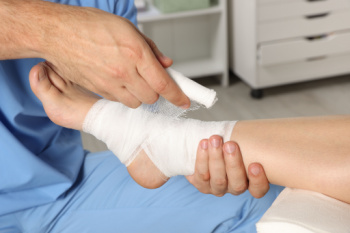Port Neches, TX (409) 727-1122
Managing Your Non-diabetic Foot Infection
Tuesday, 25 March 2025 00:00
Non-diabetic foot infections can occur due to cuts, puncture wounds, or fungal infections, leading to pain, swelling, and redness. These infections often cause throbbing or sharp pain, especially when pressure is applied to the affected area. A cut or puncture wound in the foot can allow bacteria to enter, while fungal infections, like athlete's foot, can lead to cracked skin and increased vulnerability to infection. The affected area may become warm to the touch, and you might notice discharge or pus if the infection worsens. If left untreated, the infection can spread, causing more severe pain and complications. A podiatrist can help by thoroughly cleaning the wound, draining any pus, and prescribing antibiotics if necessary. For fungal infections, they may recommend antifungal treatments to clear the infection. This type of doctor will also provide advice on proper foot care to prevent future infections. If you have this type of infection, it is suggested that you schedule an appointment with a podiatrist for appropriate treatment solutions.
Wound care is an important part in dealing with diabetes. If you have diabetes and a foot wound or would like more information about wound care for diabetics, consult with Pete O’Donald, DPM from Texas. Our doctor will assess your condition and provide you with quality foot and ankle treatment.
What Is Wound Care?
Wound care is the practice of taking proper care of a wound. This can range from the smallest to the largest of wounds. While everyone can benefit from proper wound care, it is much more important for diabetics. Diabetics often suffer from poor blood circulation which causes wounds to heal much slower than they would in a non-diabetic.
What Is the Importance of Wound Care?
While it may not seem apparent with small ulcers on the foot, for diabetics, any size ulcer can become infected. Diabetics often also suffer from neuropathy, or nerve loss. This means they might not even feel when they have an ulcer on their foot. If the wound becomes severely infected, amputation may be necessary. Therefore, it is of the upmost importance to properly care for any and all foot wounds.
How to Care for Wounds
The best way to care for foot wounds is to prevent them. For diabetics, this means daily inspections of the feet for any signs of abnormalities or ulcers. It is also recommended to see a podiatrist several times a year for a foot inspection. If you do have an ulcer, run the wound under water to clear dirt from the wound; then apply antibiotic ointment to the wound and cover with a bandage. Bandages should be changed daily and keeping pressure off the wound is smart. It is advised to see a podiatrist, who can keep an eye on it.
If you have any questions, please feel free to contact our office located in Nederland, TX . We offer the newest diagnostic and treatment technologies for all your foot care needs.





